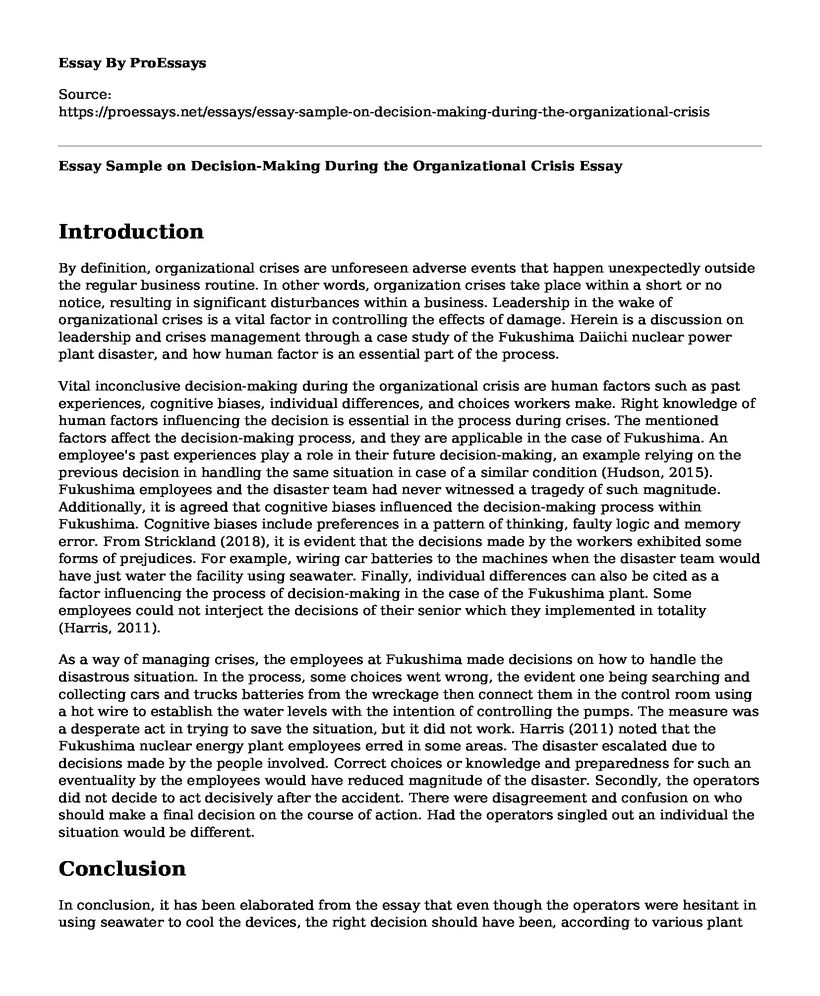Introduction
By definition, organizational crises are unforeseen adverse events that happen unexpectedly outside the regular business routine. In other words, organization crises take place within a short or no notice, resulting in significant disturbances within a business. Leadership in the wake of organizational crises is a vital factor in controlling the effects of damage. Herein is a discussion on leadership and crises management through a case study of the Fukushima Daiichi nuclear power plant disaster, and how human factor is an essential part of the process.
Vital inconclusive decision-making during the organizational crisis are human factors such as past experiences, cognitive biases, individual differences, and choices workers make. Right knowledge of human factors influencing the decision is essential in the process during crises. The mentioned factors affect the decision-making process, and they are applicable in the case of Fukushima. An employee's past experiences play a role in their future decision-making, an example relying on the previous decision in handling the same situation in case of a similar condition (Hudson, 2015). Fukushima employees and the disaster team had never witnessed a tragedy of such magnitude. Additionally, it is agreed that cognitive biases influenced the decision-making process within Fukushima. Cognitive biases include preferences in a pattern of thinking, faulty logic and memory error. From Strickland (2018), it is evident that the decisions made by the workers exhibited some forms of prejudices. For example, wiring car batteries to the machines when the disaster team would have just water the facility using seawater. Finally, individual differences can also be cited as a factor influencing the process of decision-making in the case of the Fukushima plant. Some employees could not interject the decisions of their senior which they implemented in totality (Harris, 2011).
As a way of managing crises, the employees at Fukushima made decisions on how to handle the disastrous situation. In the process, some choices went wrong, the evident one being searching and collecting cars and trucks batteries from the wreckage then connect them in the control room using a hot wire to establish the water levels with the intention of controlling the pumps. The measure was a desperate act in trying to save the situation, but it did not work. Harris (2011) noted that the Fukushima nuclear energy plant employees erred in some areas. The disaster escalated due to decisions made by the people involved. Correct choices or knowledge and preparedness for such an eventuality by the employees would have reduced magnitude of the disaster. Secondly, the operators did not decide to act decisively after the accident. There were disagreement and confusion on who should make a final decision on the course of action. Had the operators singled out an individual the situation would be different.
Conclusion
In conclusion, it has been elaborated from the essay that even though the operators were hesitant in using seawater to cool the devices, the right decision should have been, according to various plant engineers, cooling the machines using seawater which would have minimized the disastrous outcome. Also, of importance is quick decision-making on the part of operators without waiting for communication from the group leaders. Japan, being a collectivist society, limited quick decision-making. Conversely, the essay depict that had the workers made a swift and rational decision regarding the plant, the situation would be different. Indeed, Fukushima plant employees shied away from making individual decisions on a property worth millions of dollars, but in the long run, the facility was damaged.
References
Hudson, R. (2015). Decision-making: Processes, Behavioral Influences, and Role in Business Management. New York: Nova Science Publishers, Inc.
Strickland, E. (2018). Explainer: What Went Wrong in Japan's Nuclear Reactors? Retrieved from https://spectrum.ieee.org/tech-talk/energy/nuclear/explainer-what-went-wrong-in-japans-nuclear-reactors.
Harris, R. (2011, July 05). What Went Wrong In Fukushima: The Human Factor? Retrieved from https://www.npr.org/2011/07/05/137611026/what-went-wrong-in-fukushima-the-human-factor
Cite this page
Essay Sample on Decision-Making During the Organizational Crisis. (2022, Jul 08). Retrieved from https://proessays.net/essays/essay-sample-on-decision-making-during-the-organizational-crisis
If you are the original author of this essay and no longer wish to have it published on the ProEssays website, please click below to request its removal:
- Strategic Management Information System Exam
- Essay on Hilton Worldwide & Coca-Cola: Targeting Middle & Senior-Aged Professionals
- Transformational Leadership: A Theory That Accurately Describes Me - Essay Sample
- Essay Example on Katharine Graham: A Leader Embodying Self-Awareness and Relationships
- Essay Sample on International Activities: Essential for Firm Monopoly Advantage
- Essay Sample on Privacy Policy: Understanding How Your Data is Protected
- Essay on Project Manager: Ensuring Project Success in Petrochemical, IT, Architecture & Construction







